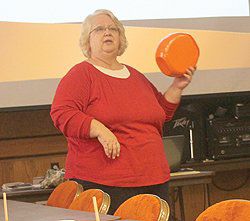The October Festive Friday focused on being prepared so you won’t be scared. Emergency preparedness was the topic. The November Festive Friday will be on Nov. 20 and will focus on things you can do with a Mason jar, including spa in a jar and other unique ideas.
Dec. 11 will be the Christmas potluck lunch which will focus on the importance of family meal time.
Christine Jensen, the extension agent said there are new guidelines for hydrogenated oil, like Crisco, These products will be changed in the next few years and eliminated by 2018, because they are unhealthy.
Jensen showed a toilet paper roll that you cut slits in and place a glow stick inside and it looks like eyes, for a Halloween decoration. You can place them in trees and on window ledges.
One important part of emergency preparedness is saving water. Store in juice bottles or pop jugs, but don’t store in milk jugs because they aren’t sturdy enough.
Why prepare? The culture of Utah teaches to be prepared. Prepare out of general concern or fear of events which might take place including job loss, down economy, natural disasters; be prepared to be self reliant.
Jensen said acts of terrorism are also reasons to be prepared. All disasters don’t have to be huge. Small disasters can present problems, like flat tires; do you have a budget; do you pay your bills on time; do you know where the stairs are in a hotel?
Have cash money on hand in small denominations. Keep your car filled with gas.
It’s better to be prepared for an opportunity and not have one than to have an opportunity and not be prepared: quote by Whitney M. Young.
Some people don’t prepare because they don’t have the skills or knowledge. They don’t have the time or money.
Being prepared gives you peace of mind. Prepare a little at a time. Be confident, resilient, stay calm. If you’re prepared, you will recover faster after a disaster. In a natural disaster, it can take two weeks before help comes. You must be prepared to take care of yourself and your family.
Natural disasters caused over $2 trillion in damages between the year 2000-2014. They affected more than 3 billion people. They include wildfire, floods, earthquakes, hurricanes, typhoons, tornadoes, tropical storms, volcanic activity, landslides and mudslides and tsunamis.
Be prepared by having an extra copy of all important and essential documents, birth certificates, social security, marriage certificates, deeds and titles; have them in a safe waterproof place.
Forty percent of all cell phone users don’t know their family phone numbers. Keep a hard copy of all phone numbers and keep information on a flash drive. Half of all Americans lack supplies that would help them in a disaster. Have a planned meeting place for family members. Have a plan on who will pick up the kids from school. There will be people out looking for supplies and water. There are looters in emergency situations.
With the installation of the new fiber optics, the back-up batteries for the landlines will last about eight hours. Look into having a back-up battery for your back-up system.
In an earthquake, don’t get in a doorway, they aren’t built like they used to be. Use a broader item for protection like a table. Earthquakes have an up and down movement. Animals can sometimes sense earthquakes. Earthquakes aren’t predictable and can happen at any time day or night.
Take steps: create a plan, budget, save, store, get information, think ahead, review and update. Check Bereadyutah.gov for more detailed information on preparation and what you need.
Don’t store food you don’t like or won’t eat or that you won’t be able to cook. Have an alternative way of cooking. Have propane on hand for bbqs and propane stoves. Have alternative shelter, camp trailers and tents.
People from other areas may come here from a disaster in their area, be prepared for them.
Some items to have in your kits include; candles, matches, food, first aid supplies, flashlight and batteries, poncho, blankets, money, hand warmers, cell charger, emergency ID cards, medications, diaper wipes, food for pets, clothing change, luggage.
Another disaster which would probably be an act of terrorism is an electro magnetic pulse which can knock out all electronics.
Bring a small food supply with you when you stay in hotels and go to airports, you never know when you may not have time to get something to eat or in an emergency, supplies may run out.
Know how to shut off your utilities, but only shut them off as needed, because the gas company will have to come to turn the gas back on. Recovery may take time, the resiliency of your family is important.
Jensen received donations of storage buckets from Intermountain Farmers, Tractor Supply and Sutherlands to hand out to all attendees. Thanks to those businesses. They also received a small starter kit containing matches, food and rain gear.
Jensen instructed those present to use the buckets to get started and place emergency supplies in the buckets including flashlights and batteries. Also have water purification with your emergency supplies.
She encouraged people to give food storage gifts for Christmas.
The group had lunch with Halloween goodies including caramel apples, recipes for the lunch items were available.
Disasters disrupt hundreds of thousands of lives each year. They have lasting effects on both people and property, yet about 30 percent of American families do not have any kind of preparedness.
Jensen encouraged everyone to get started. If you are prepared, you will have nothing to fear.
Festive Friday: be prepared for emergencies

"Christine Jensen shows a Tide container which can be decorated like a pumpkin."
